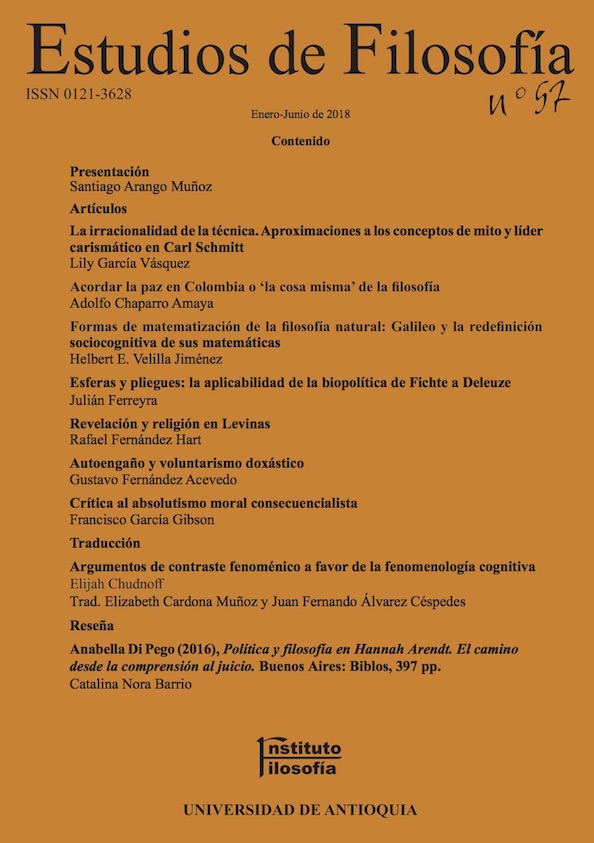Critique of consequentialist moral absolutism
DOI:
https://doi.org/10.17533/udea.ef.n57a08Keywords:
Moral absolutism, consequentialism, deontologism, bias, rights, special obligationsAbstract
In this work, I assess critically three arguments in favor of moral absolutism. Perhaps surprisingly, these arguments justify absolutism because of its consequences. The first argument point out from certain cognitive biases in orden to show that treating moral norms as absolute maximizes our conformity with these norms. The second argument holds that we must deal with a right as absolute when it is not possible to compensate the infraction of that right; otherwise, rights would lose all practical relevance. The third argument starts o with the intrinsic value of special relationships, like friendship, to show that special relationships will be undermined if we do not treat special obligations as absolute. The three arguments fail because they do not show that treating certain moral norms as absolute is neither necessary nor suffcient to accomplish the important consequences that the arguments identify.
Downloads
References
Alexander, L., & Moore, M. (2016). Deontological ethics. En: Zalta, E. N. (Ed.), The Stanford Encyclopedia of Philosophy (Winter 2016). Accesible en https://plato.stanford.edu/archives/win2016/entries/ethics–deontological/. Accedido el 7/6/17
Donagan, A. (1977). The theory of morality. Chicago: University of Chicago Press.
Foot, P. (1967). The problem of abortion and the doctrine of double effect. Oxford Reviews of Reproductive Biology, 5, 5–15.
Gewirth, A. (1981). Are there any absolute rights? The Philosophical Quarterly, 31 (122), 1–16.
Gewirth, A. (1982). There are absolute rights. The Philosophical Quarterly, 32 (129), 348–353.
Hill, T. E. (1983). Moral purity and the lesser evil. The Monist, 66 (2), 213–232.
Hooker, B. (2016). Rule consequentialism. En E. N. Zalta (Ed.), The Stanford Encyclopedia of Philosophy (Winter 2016). Accesible en https://plato.stanford.edu/archives/win2016/entries/consequentialism–rule/. Accedido el 7/6/17
Kant, I. (1996). On a supposed right to lie from philanthropy (1797). En M. J. Gregor, I. Kant, M. J. Gregor, & A. W. Wood (Eds.), Immanuel Kant: Practical philosophy, (pp. 605–616).
Korsgaard, C. M. (1986). The right to lie: Kant on dealing with evil. Philosophy & Public A airs, 15 (4), 325–349.
McConnell, T. C. (1981). Moral blackmail. Ethics, 91 (4), 544–567.
Paulhus, D. L., & John, O. P. (1998). Egoistic and moralistic biases in self– perception: the interplay of self–deceptive styles with basic traits and motives. Journal of Personality, 66 (6), 1025–1060.
Raz, J. (1986). The morality of freedom. Oxford: Clarendon Press.
Sharot, T. (2012). The optimism bias: why we’re wired to look on the brightside. London: Robinson.
Thomson, J. J. (1985). The trolley problem. The Yale Law Journal, 94 (6), 1395–1415.
Walzer, M. (1977). Just and unjust wars: a moral argument with historical illustrations. New York: Basic Books.
Published
How to Cite
Issue
Section
Categories
License
Copyright (c) 2018 Francisco García Gibson

This work is licensed under a Creative Commons Attribution-NonCommercial-ShareAlike 4.0 International License.
Authors who publish with this journal agree to the following terms:
1. The Author retains copyright in the Work, where the term "Work" shall include all digital objects that may result in subsequent electronic publication or distribution.
2. Upon acceptance of the Work, the author shall grant to the Publisher the right of first publication of the Work.
3. The Author shall grant to the Publisher a nonexclusive perpetual right and license to publish, archive, and make accessible the Work in whole or in part in all forms of media now or hereafter known under a Creative Commons Attribution-NoCommercia-ShareAlike (CC BY-NC-SA 4.0), or its equivalent, which, for the avoidance of doubt, allows others to copy, distribute, and transmit the Work under the following conditions: (a) Attribution: Other users must attribute the Work in the manner specified by the author as indicated on the journal Web site;(b) Noncommercial: Other users (including Publisher) may not use this Work for commercial purposes;
4. The Author is able to enter into separate, additional contractual arrangements for the nonexclusive distribution of the journal's published version of the Work (e.g., post it to an institutional repository or publish it in a book), as long as there is provided in the document an acknowledgement of its initial publication in this journal;
5. Authors are permitted, and Estudios de Filosofía promotes, to post online the preprint manuscript of the Work in institutional repositories or on their Websites prior to and during the submission process, as it can lead to productive exchanges, as well as earlier and greater citation of published work (see The Effect of Open Access). Any such posting made before acceptance and publication of the Work is expected be updated upon publication to include a reference to the Estudios de Filosofía's assigned URL to the Article and its final published version in Estudios de Filosofía.















